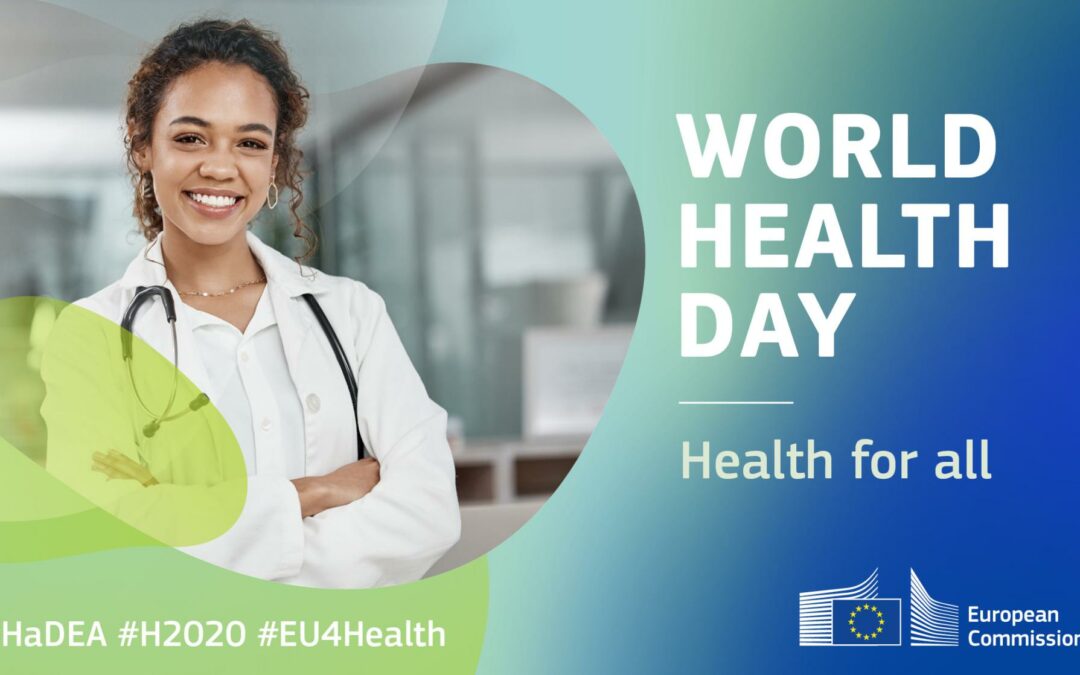World Health Day is a global health awareness day celebrated every year on 7 April. This year’s theme focuses on the importance of healthcare with its slogan “Health For All”.
In line with the European Commission, together with EU countries, being working to improve EU health systems and ensure equal access to modern and efficient healthcare for all citizens, HaDEA is and has been funding projects and initiatives that are addressing health inequalities by developing successful strategies and innovative technologies to facilitate access to healthcare.
The JADECARE team proudly announces that it is being showcased by HADEA as one of five projects, i.e. AHEAD (addressing medical deserts), ROUTE-HWF (Roadmap OUT of mEdical deserts into supportive Health WorkForce initiatives and policies), OASES (serving as a source of knowledge for EU countries in European medical deserts), JADECARE and HTx (developing methodologies to deliver more customised information on the efficacy and cost-effectiveness of personalised combinations of health technologies for healthcare professionals to use when treating patients).
Read here below the five “Health for All” sibling projects’ short descriptions and visit the HaDEA website for the full story.
AHEAD: Funded under the Third health programme, the Action for Health and Equity – addressing medical deserts (AHEAD) project is addressing the challenge of medical deserts which are areas with falling number of medical practitioners. in Europe. AHEAD’s goal is to achieve better access to health services in underserved areas in the countries involved in the project, namely Italy, Moldova, the Netherlands, Romania, and Serbia. The project has developed tools to monitor, identify and map medical deserts.
ROUTE-HWF: Funded under the Third health programme, the project Roadmap OUT of mEdical deserts into supportive Health WorkForce initiatives and policies (ROUTE-HWF) aims to help EU countries to design and implement health workforce policies related to medical deserts. The project has developed guidelines on how EU countries can monitor and measure medical deserts and provided in-depth insights on factors driving “desertification”.
OASES: Funded under the Third health programme, the Promoting evidence-based reforms (OASES) project aims to serve as a source of knowledge for EU countries in European medical deserts. The project is identifying the various factors contributing to the desertification and is mapping possible solutions. OASES is also providing recommendations in the legal and policy environment to remove legal barriers to the recruitment and retention of healthcare workforce in underserved areas.
JADECARE: Funded under the Third health programme, the Joint Action on implementation of digitally enabled integrated person-centred care (JADECARE) aims to support health authorities in the transition to a more digital, integrated and personalised care. It aims at doing that by facilitating transfer and adoption of best practices. The project involves partners from 17 EU countries and has identified 4 best practices from Spain (The Basques and Catalonia), Denmark and Germany. The good practices are being applied to the participating countries. This will help reduce health inequalities within the EU and encourage innovations on digitally enabled person-centred care solutions.
HTx: Funded under Horizon 2020, the project aims to develop methodologies to deliver more customised information on the efficacy and cost-effectiveness of personalised combinations of health technologies for healthcare professionals to use when treating patients. To ensure the sustainability of the project, HTx is working closely with the European Network for Health Technology Assessment (EUnetHTA) and will provide a toolbox of different reimbursement and pricing options for both HTA organisations and patients.
